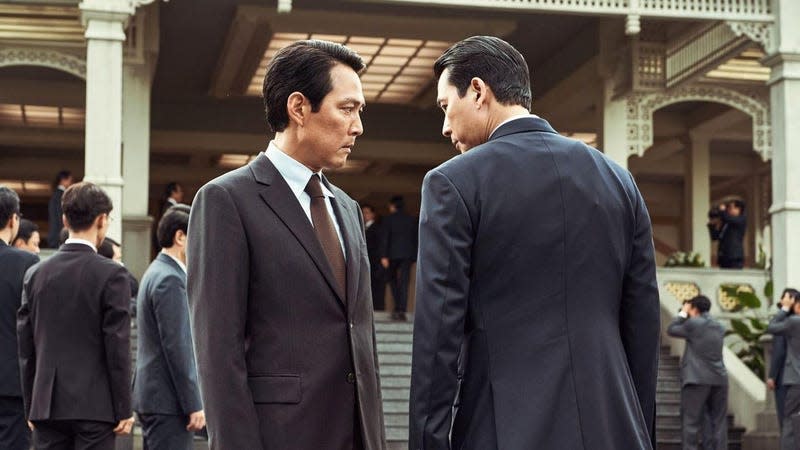Hunt review: Lee Jung-jae plays another deadly game

- Oops!Something went wrong.Please try again later.
- Oops!Something went wrong.Please try again later.
- Oops!Something went wrong.Please try again later.
- Oops!Something went wrong.Please try again later.
Lee Jung-jae and Jung Woo-sung in Hunt
Lee Jung-jae follows up his Emmy-winning turn in Squid Game with the ambitious espionage thriller Hunt, a film set in South Korea during the height of the Cold War. Lee stars in, directs, co-writes, and co-produces this taut, extravagant, and technically proficient effort, which comes off more as an auspicious filmmaking debut than a vanity project, one that stacks up favorably with most American spy thrillers.
Dangling the caveat of its fictional nature upfront, the film draws liberally from the political intrigue and instability of South Korea’s Fifth Republic under Chun Doo-hwan’s brutal military dictatorship. Though tensions persist between the two Koreas four decades later, the film’s 1980s universe is unrecognizable from the candy-colored land of K-pop today.
Read more
Before its title even emerges, Hunt thrusts viewers into an elaborate set piece complete with a messy shootout and an exploding grenade. Park Pyong-ho (Lee), chief of KCIA’s foreign unit, and Kim Jung-do (Jung Woo-sung, The Good, The Bad, The Weird), chief of KCIA’s domestic unit, attempt to foil an assassination plot on the South Korean president during a U.S. visit. Merely two minutes in, Lee Jung-jae is already flexing by having cinematographer Lee Mo-gae line up an intricate shot of Chief Kim gradually falling out of focus as a revolving door in the background spins to reveal Chief Park standing behind, in focus. Right off the bat, the film aspires to a level of sophistication on par with Decision To Leave. Although it doesn’t fully live up to that comparison, it’s exciting to see a filmmaking novice stretch like this.
A spy is apparently among the ranks of the KCIA, leaking to North Korea the president’s international travel itineraries, plans to retrieve a defector and his family in Japan, and details of special ops. The two chiefs must investigate each other’s units to uncover the double agent. These inquiries are apparently routine, as Chief Park casually relays to Chief Kim’s wife over dinner, seemingly without an ounce of animosity, that he was tortured while questioned by her husband some years ago. But soon they’ll set about digging up dirt on one another, with each pinning the rival as the mole.
The film drops an abundance of clues that cast suspicion on both men. The premise seems derivative of doubling characters in classic Hong Kong action flicks—City On Fire, Hard Boiled, et al.—that have spawned copycats worldwide, such as Face/Off. Hunt specifically recalls Infernal Affairs and, to a much lesser extent, the 1999 South Korean film Shiri, which itself found inspiration in Hong Kong cinema.
Chief Park more closely resembles Lee’s pre-established screen persona in South Korea than Gi-hun from Squid Game, and it’s a bit surprising that the characterization of Chief Park allows little room for Lee to showcase his acting range. Most stars-turned-filmmakers have a reputation for being actors’ directors, but Lee is an exception. The film doesn’t boast any performance that’s particularly memorable, including his own and Jung’s. Heo Sung-tae, who plays the fearsome hoodlum Deok-su in Squid Game, also seems underutilized here.
The writing is where Lee’s inexperience shows. Though perhaps not readily noticeable to viewers leaning on subtitles, the screenplay by Lee and Jo Seung-hee is rather verbose. Agent Ju-kyung (Jeon Hye-jin) often walks alongside Chief Park to debrief him, in the process spelling everything out for the viewers. Espionage is inherently confusing, with myriad false identities and double-crosses. The urge to overexplain is understandable, but it’s not helpful in the midst of numerous flashbacks muddling the proceedings.
Hunt - Official Trailer | Directed by Lee Jung-jae
The most compelling sequence is actually without dialogue, showing a launderer transcribing Morse code stitched onto the cuffs of a dress shirt. Otherwise, production designer Park Il-hyun misses the opportunity to style an ’80s look beyond period markers like pagers and bulky cell phones.
Relentlessly grim, the movie does elicit very visceral reactions. Much like Squid Game, there are characters in Hunt we root for by default who don’t make it to the end. If Squid Game represents the ruthlessness of capitalism, Hunt reflects the human cost in the jostling for political power and dominance. Few characters are pure and not dabbling in some sinister plot, but who can blame them when the reigning regime was responsible for the Gwangju Massacre that claimed hundreds of lives? There have been several serious treatments of this tragic chapter in Korean history, so simple genre entertainment isn’t off limits. Some viewers will, unfortunately, be left with no context to recognize who or what is the real enemy.
More from The A.V. Club
Sign up for The A.V. Club's Newsletter. For the latest news, Facebook, Twitter and Instagram.

